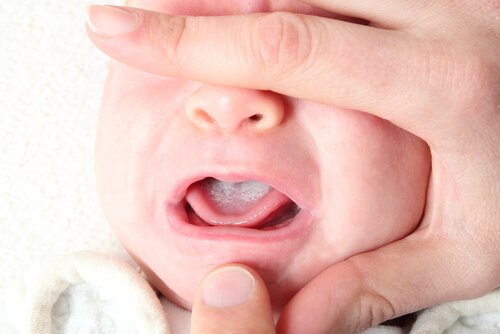Oral Thrush: Causes, Symptoms, and Prevention

Oral thrush is an oral infection caused by the candida albicans fungus. It can be quite unpleasant and uncomfortable. This infection is more common among children than you might think.
It’s caused by the same fungus that can cause diaper rash and vaginal infections, commonly known as candidiasis.
Causes of Oral Thrush
Normally our bodies maintain a balance among the micro-organisms that inhabit them. However, sometimes this balance is altered for various reasons. This is when fungi like candida albicans start to multiply at an accelerated rate, primarily in the mouth and pharynx.
When this occurs in older children or adults, it indicates the presence of an immune disorder. However, oral candidiasis is common in newborns.
One of the reasons that the immune system might be momentarily compromised is the use of antibiotics to fight another infection.
Another main cause is birth itself. If the mother has a vaginal infection during delivery, the baby comes into contact with the fungus and can easily be infected. It can also be transmitted through the nipple of a bottle.
Symptoms and treatment
The fungus develops in the mouth area and covers the tongue and palate. It can also spread to the inner cheeks and the pharynx. It appears as white patches that look lumpy and granular.
Be very careful once the patches have developed. If they’re scratched or broken open, they will bleed heavily and the baby may refuse to nurse because of the pain.
As noted above, this same fungus is also responsible for diaper rash. In that case, the infection appears as red bumps, rather than white. In the case of a vaginal infection, it’s similar to diaper rash.
In general, the infection will go away on its own. However, it’s important to see a doctor so he or she can see the severity of the infection and prescribe appropriate treatment.

Specialists can evaluate the fungus using a microscope to determine the cause. This allows them to make an appropriate recommendation to help avoid the illness in the future.
To treat it, usually doctors prescribe medicine to be taken orally, or applied directly on the patches that form in the mouth and pharynx.
It’s also a good idea to intensify hygiene practices. These should include frequent hand-washing, changing diapers regularly, keeping your baby from putting their hands in their mouth if they’re dirty, and for adults, using mouth wash.
Prevention
Logically enough, the best way to prevent infection with this fungus is to eliminate circumstances that help it spread:
- First, women should have a urinalysis 15 days before giving birth to verify that no infection is present. If there is a vaginal infection, start treatment as soon as possible. Check that the problem is resolved completely a few days before delivery. This can be done with another urinalysis.
- It’s also important to meticulously disinfect bottle nipples. As noted above, bottle nipples are one of the main ways that the infection spreads. The best thing to do is use a bottle sterilizer or put the nipples in boiling water for 3 minutes, or in steam for 5 minutes.

- The most important thing is to strengthen the baby’s immune system. To do this, breast milk should be the baby’s only food source for the first 6 months. This is the best way to provide the vitamins and minerals that the baby needs to stay fully healthy.
- Another way to avoid oral thrush is to be careful about hygiene. Avoid letting your baby put his hands in his mouth if they’re dirty. If your baby has diaper rash, he might touch it because it’s irritated, and transfer the fungus to the mouth that way.
“To strengthen your baby’s immune system, breast milk should be the only source of food for the first 6 months”
These tips can help you prevent oral thrush for your newborn and avoid discomfort for your baby. Keep them in mind and don’t skimp on preventative measures.
Oral thrush is an oral infection caused by the candida albicans fungus. It can be quite unpleasant and uncomfortable. This infection is more common among children than you might think.
It’s caused by the same fungus that can cause diaper rash and vaginal infections, commonly known as candidiasis.
Causes of Oral Thrush
Normally our bodies maintain a balance among the micro-organisms that inhabit them. However, sometimes this balance is altered for various reasons. This is when fungi like candida albicans start to multiply at an accelerated rate, primarily in the mouth and pharynx.
When this occurs in older children or adults, it indicates the presence of an immune disorder. However, oral candidiasis is common in newborns.
One of the reasons that the immune system might be momentarily compromised is the use of antibiotics to fight another infection.
Another main cause is birth itself. If the mother has a vaginal infection during delivery, the baby comes into contact with the fungus and can easily be infected. It can also be transmitted through the nipple of a bottle.
Symptoms and treatment
The fungus develops in the mouth area and covers the tongue and palate. It can also spread to the inner cheeks and the pharynx. It appears as white patches that look lumpy and granular.
Be very careful once the patches have developed. If they’re scratched or broken open, they will bleed heavily and the baby may refuse to nurse because of the pain.
As noted above, this same fungus is also responsible for diaper rash. In that case, the infection appears as red bumps, rather than white. In the case of a vaginal infection, it’s similar to diaper rash.
In general, the infection will go away on its own. However, it’s important to see a doctor so he or she can see the severity of the infection and prescribe appropriate treatment.

Specialists can evaluate the fungus using a microscope to determine the cause. This allows them to make an appropriate recommendation to help avoid the illness in the future.
To treat it, usually doctors prescribe medicine to be taken orally, or applied directly on the patches that form in the mouth and pharynx.
It’s also a good idea to intensify hygiene practices. These should include frequent hand-washing, changing diapers regularly, keeping your baby from putting their hands in their mouth if they’re dirty, and for adults, using mouth wash.
Prevention
Logically enough, the best way to prevent infection with this fungus is to eliminate circumstances that help it spread:
- First, women should have a urinalysis 15 days before giving birth to verify that no infection is present. If there is a vaginal infection, start treatment as soon as possible. Check that the problem is resolved completely a few days before delivery. This can be done with another urinalysis.
- It’s also important to meticulously disinfect bottle nipples. As noted above, bottle nipples are one of the main ways that the infection spreads. The best thing to do is use a bottle sterilizer or put the nipples in boiling water for 3 minutes, or in steam for 5 minutes.

- The most important thing is to strengthen the baby’s immune system. To do this, breast milk should be the baby’s only food source for the first 6 months. This is the best way to provide the vitamins and minerals that the baby needs to stay fully healthy.
- Another way to avoid oral thrush is to be careful about hygiene. Avoid letting your baby put his hands in his mouth if they’re dirty. If your baby has diaper rash, he might touch it because it’s irritated, and transfer the fungus to the mouth that way.
“To strengthen your baby’s immune system, breast milk should be the only source of food for the first 6 months”
These tips can help you prevent oral thrush for your newborn and avoid discomfort for your baby. Keep them in mind and don’t skimp on preventative measures.
This text is provided for informational purposes only and does not replace consultation with a professional. If in doubt, consult your specialist.








